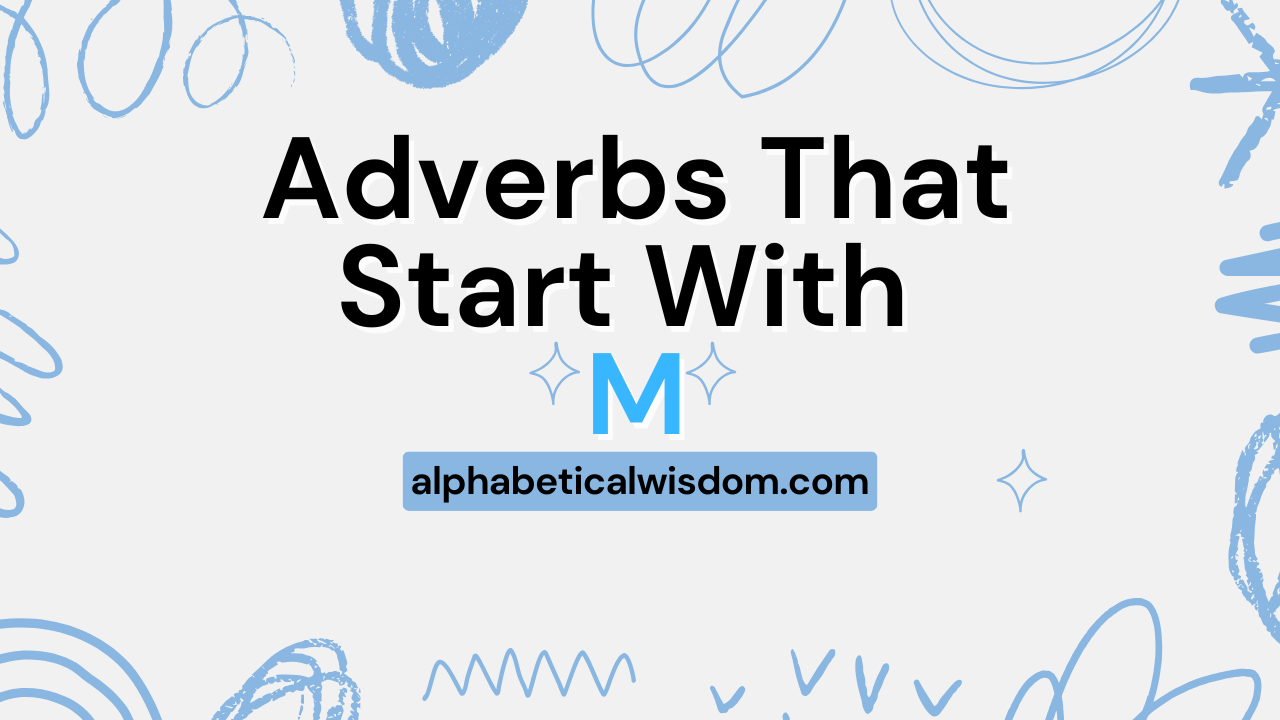Adverbs Starting With M: A Comprehensive Grammar Guide
Adverbs are essential components of English grammar, enriching sentences by providing details about verbs, adjectives, or other adverbs. Focusing on adverbs that begin with the letter “M” offers a unique perspective into how these words function and contribute to sentence structure and meaning.
Understanding these adverbs enhances precision and clarity in both writing and speech. This guide is designed for English language learners, teachers, and anyone seeking to refine their grammatical skills.
This article provides a comprehensive exploration of adverbs starting with “M,” covering their definition, structure, types, usage rules, common mistakes, and advanced applications. Numerous examples and practice exercises are included to solidify understanding and improve practical application.
By the end of this guide, you will have a solid grasp of how to effectively use “M” adverbs to add depth and nuance to your communication.
Table of Contents
- Definition of Adverbs Starting With M
- Structural Breakdown
- Types and Categories of Adverbs Starting With M
- Examples of Adverbs Starting With M
- Usage Rules for Adverbs Starting With M
- Common Mistakes with Adverbs Starting With M
- Practice Exercises
- Advanced Topics
- FAQ
- Conclusion
Definition of Adverbs Starting With M
Adverbs are words that modify verbs, adjectives, or other adverbs. They provide additional information about how, when, where, to what extent, or how often an action is performed or a quality is exhibited.
Adverbs starting with “M” function in the same way, adding specific details that enhance the meaning of a sentence. These adverbs are crucial for creating vivid and precise descriptions.
Adverbs can be classified based on their function. Adverbs of manner describe how something is done (e.g., *methodically*). Adverbs of time specify when something happens (e.g., *monthly*). Adverbs of place indicate where something occurs (e.g., *midway*). Adverbs of degree express to what extent something is true (e.g., *much*). Adverbs of frequency tell how often something happens (e.g., *mostly*). Understanding these classifications is key to using adverbs effectively.
In different contexts, adverbs starting with “M” can significantly alter the meaning of a sentence. For example, “He managed masterfully” conveys a different level of skill compared to “He managed.” The choice of adverb depends on the intended nuance and the specific detail you wish to convey. Adverbs like *merrily*, *mildly*, *mistakenly*, and *morally* each bring a unique flavor to the sentences they modify, shaping the reader’s perception of the action or state being described.
Structural Breakdown
The structure of adverbs starting with “M” can vary. Some are simple words, while others are formed by adding suffixes like “-ly” to adjectives.
For instance, “madly” is derived from the adjective “mad,” whereas “more” and “much” stand alone as adverbs. The structural composition often dictates the adverb’s function and how it interacts with other words in the sentence.
Many adverbs ending in “-ly” are formed by adding this suffix to adjectives. This is a common pattern in English grammar.
However, not all words ending in “-ly” are adverbs; some are adjectives (e.g., *friendly*, *lovely*). It’s essential to identify the word’s function within the sentence to determine whether it’s acting as an adverb or an adjective.
The position of an adverb in a sentence can also affect its meaning and emphasis. Adverbs can appear at the beginning, middle, or end of a sentence, depending on the desired effect. For example, “Maybe I will go” places emphasis on the uncertainty, while “I will maybe go” suggests a possibility but less prominently. “I will go, maybe” adds an afterthought feel. Understanding how to strategically position adverbs enhances the clarity and impact of your writing.
Types and Categories of Adverbs Starting With M
Adverbs of Manner
Adverbs of manner describe how an action is performed. They provide details about the way in which something is done.
These adverbs often end in “-ly” and are placed either after the verb they modify or after the object if there is one.
Examples of adverbs of manner starting with “M” include: *madly*, *magically*, *manfully*, *markedly*, *masterfully*, *meekly*, *melodically*, *memorably*, *menacingly*, *merely*, *merrily*, *methodically*, *mildly*, *miserably*, *mockingly*, *modestly*, *morally*, *mortally*, *mostly*, and *mysteriously*.
For instance, in the sentence “She danced merrily,” the adverb “merrily” describes how she danced. Similarly, “He solved the problem methodically” indicates that his approach was well-organized and systematic. Adverbs of manner add depth and vibrancy to descriptions, allowing for a more nuanced understanding of the action.
Adverbs of Time
Adverbs of time indicate when an action occurs. They specify the timing or duration of an event.
These adverbs can refer to a specific point in time, a period, or the frequency of an action.
Examples of adverbs of time starting with “M” include: *meanwhile*, *monthly*, *mornings*, *momently*.
For example, “Meanwhile, the investigation continued” indicates that the investigation was ongoing during a specific period. “The report is due monthly” specifies the frequency with which the report must be submitted. Adverbs of time provide essential context for understanding when events take place.
Adverbs of Place
Adverbs of place describe where an action occurs. They provide information about the location or direction of an event.
These adverbs can indicate a specific place or a general area.
Examples of adverbs of place starting with “M” include: *midway*, *moreover* (can also function as a conjunctive adverb).
For instance, “They stopped midway through the journey” indicates that they paused at a point in the middle of their route. “Moreover, the evidence suggests…” can indicate adding information to a location or situation in a discussion. Adverbs of place help to create a clear picture of where events are happening.
Adverbs of Degree
Adverbs of degree express the intensity or extent of an action or quality. They indicate how much or to what degree something is true.
These adverbs modify verbs, adjectives, or other adverbs.
Examples of adverbs of degree starting with “M” include: *much*, *more*, *most*, *mightily*, *marginally*.
For example, “I much appreciate your help” indicates a high level of gratitude. “She is more intelligent than her brother” expresses a greater degree of intelligence. “This is the most beautiful painting I’ve ever seen” signifies the highest level of beauty. Adverbs of degree allow for precise expression of intensity and extent.
Adverbs of Frequency
Adverbs of frequency indicate how often an action occurs. They specify the regularity or repetition of an event.
These adverbs can express definite or indefinite frequency.
Examples of adverbs of frequency starting with “M” include: *mainly*, *mostly*.
For instance, “I mainly eat vegetarian meals” indicates that vegetarian meals are the predominant choice. “It is mostly sunny in California” suggests that sunny weather is the typical condition. Adverbs of frequency provide valuable information about the regularity of events.
Examples of Adverbs Starting With M
The following tables provide extensive examples of adverbs starting with “M” used in various contexts. These examples are categorized by the type of adverb to illustrate their diverse functions and applications.
Table 1: Adverbs of Manner Starting With M
This table showcases adverbs of manner that begin with “M,” demonstrating how they modify verbs to describe *how* an action is performed. These adverbs add detail and nuance to the description of the action, providing a clearer picture of the way something is done.
| Adverb | Example Sentence |
|---|---|
| Madly | She laughed madly at the joke. |
| Magically | The magician transformed the rabbit magically. |
| Manfully | He faced the challenge manfully, never giving up. |
| Markedly | The patient’s condition improved markedly after the treatment. |
| Masterfully | The chef prepared the dish masterfully. |
| Meekly | He accepted the criticism meekly. |
| Melodically | The birds sang melodically in the early morning. |
| Memorably | The concert was memorably performed. |
| Menacingly | The storm clouds gathered menacingly overhead. |
| Merely | He merely glanced at the newspaper. |
| Merrily | The children played merrily in the park. |
| Methodically | The detective investigated the crime scene methodically. |
| Mildly | She was mildly surprised by the news. |
| Miserably | He failed miserably in his attempt to climb the mountain. |
| Mockingly | The bully imitated him mockingly. |
| Modestly | She accepted the award modestly. |
| Morally | He acted morally, always doing what he believed was right. |
| Mortally | He was mortally wounded in the battle. |
| Mostly | She mostly spends her time reading. |
| Mysteriously | The artifact disappeared mysteriously from the museum. |
| Meaningfully | They looked at each other meaningfully. |
| Majestically | The eagle soared majestically through the sky. |
| Maternally | She cared for the orphaned child maternally. |
| Materially | The new policy materially affected the company’s profits. |
| Maturely | He handled the situation maturely, showing great wisdom. |
Table 2: Adverbs of Time Starting With M
This table presents adverbs of time that begin with “M,” illustrating how they specify *when* an action occurs. These adverbs help to establish the temporal context of events, clarifying the timing or duration of the action.
| Adverb | Example Sentence |
|---|---|
| Meanwhile | Meanwhile, back at the ranch, the cowboys were preparing dinner. |
| Monthly | The magazine is published monthly. |
| Mornings | He usually goes for a run in the mornings. |
| Momently | We expect the package to arrive momently. |
| Millennially | The trees have grown millennially, witnessing centuries of change. |
| Mid-century | The furniture was designed mid-century, reflecting the styles of the 1950s. |
Table 3: Adverbs of Place Starting With M
This table provides examples of adverbs of place that begin with “M,” demonstrating how they indicate *where* an action takes place. These adverbs help to establish the location or direction of events within a sentence.
| Adverb | Example Sentence |
|---|---|
| Midway | They stopped midway through the hike to rest. |
| Moreover | Moreover, the new evidence supports the theory. |
Table 4: Adverbs of Degree Starting With M
This table illustrates adverbs of degree that begin with “M,” showing how they express the *intensity* or *extent* of an action or quality. These adverbs modify verbs, adjectives, or other adverbs to indicate the degree to which something is true.
| Adverb | Example Sentence |
|---|---|
| Much | I much appreciate your help. |
| More | She is more talented than her peers. |
| Most | This is the most delicious cake I have ever tasted. |
| Mightily | He fought mightily to defend his title. |
| Marginally | The company’s profits increased marginally this quarter. |
Table 5: Adverbs of Frequency Starting With M
This table presents adverbs of frequency that begin with “M,” demonstrating how they indicate *how often* an action occurs. These adverbs specify the regularity or repetition of an event within a sentence.
| Adverb | Example Sentence |
|---|---|
| Mainly | He mainly eats fruits and vegetables. |
| Mostly | The audience was mostly composed of students. |
Usage Rules for Adverbs Starting With M
Adverbs should be placed as close as possible to the words they modify to avoid ambiguity. For adverbs of manner, this usually means placing them after the verb or after the object if there is one.
For adverbs of time and place, placement can vary depending on the emphasis desired.
When using adverbs of degree, ensure they are placed directly before the adjective, verb, or other adverb they modify. Incorrect placement can change the meaning of the sentence. For example, “I much appreciate your help” is correct, while “I appreciate much your help” is grammatically incorrect.
Some adverbs, like *moreover*, also function as conjunctive adverbs. Conjunctive adverbs connect two independent clauses and provide a transition between them. When using *moreover* as a conjunctive adverb, it should be preceded by a semicolon and followed by a comma (e.g., “The evidence is compelling; moreover, witnesses corroborate the story.”
Be mindful of the difference between adverbs and adjectives. While many adverbs end in “-ly,” not all words ending in “-ly” are adverbs.
Some are adjectives. Ensure that the word is modifying a verb, adjective, or another adverb to confirm it is being used as an adverb.
For example, *friendly* is an adjective, while *merrily* is an adverb.
Common Mistakes with Adverbs Starting With M
One common mistake is confusing adverbs and adjectives, particularly with words ending in “-ly.” Remember that adverbs modify verbs, adjectives, or other adverbs, while adjectives modify nouns. For example:
- Incorrect: He is a mostly friendly person.
- Correct: He is a mostly friendly person. (Mostly modifies the adjective “friendly”)
- Correct: He mostly eats vegetarian meals. (Mostly modifies the verb “eats”)
Another common mistake is incorrect placement of adverbs, which can lead to ambiguity or change the meaning of the sentence. Consider the following examples:
- Incorrect: I appreciate much your help.
- Correct: I much appreciate your help.
Misusing conjunctive adverbs like *moreover* is another frequent error. Remember to use the correct punctuation when connecting two independent clauses:
- Incorrect: The evidence is compelling, moreover witnesses corroborate the story.
- Correct: The evidence is compelling; moreover, witnesses corroborate the story.
Practice Exercises
Exercise 1: Identifying Adverbs
Identify the adverbs starting with “M” in the following sentences.
| Question | Answer |
|---|---|
| 1. She sang melodically during the concert. | melodically |
| 2. Meanwhile, the team continued their research. | Meanwhile |
| 3. He much appreciates your dedication. | much |
| 4. They stopped midway to enjoy the view. | midway |
| 5. The report is due monthly. | monthly |
| 6. The children played merrily in the garden. | merrily |
| 7. He manfully admitted his mistake. | manfully |
| 8. She mostly drinks tea in the morning. | mostly |
| 9. The magician magically made the rabbit disappear. | magically |
| 10. Moreover, the data supports our hypothesis. | Moreover |
Exercise 2: Using Adverbs in Sentences
Fill in the blanks with an appropriate adverb starting with “M.”
| Question | Answer |
|---|---|
| 1. The patient’s condition improved ________ after the surgery. | markedly |
| 2. ________, the negotiations are still ongoing. | Meanwhile |
| 3. I ________ prefer coffee over tea. | much |
| 4. They decided to stop ________ through the race. | midway |
| 5. The bills are sent out ________. | monthly |
| 6. The choir sang ________ during the Christmas service. | merrily |
| 7. He faced the challenge ________, showing great courage. | manfully |
| 8. She ________ studies in the library. | mostly |
| 9. The fairy ________ transformed the pumpkin into a carriage. | magically |
| 10. ________, the new research confirms our findings. | Moreover |
Exercise 3: Correcting Mistakes
Identify and correct the errors in the following sentences.
| Question | Answer |
|---|---|
| 1. He is a mostly kind person. | He is mostly a kind person. / He is a very kind person. |
| 2. I appreciate much your effort. | I much appreciate your effort. |
| 3. The evidence is strong, moreover it is undeniable. | The evidence is strong; moreover, it is undeniable. |
| 4. She sang melodically, and beautifully. | She sang melodically and beautifully. |
| 5. They stopped midway, because they were tired. | They stopped midway because they were tired. |
| 6. He completed the project methodically. | Correct. |
| 7. The report is due monthly, and promptly. | The report is due monthly and must be submitted promptly. |
| 8. She mostly enjoys reading books. | Correct. |
| 9. The magician preformed magically. | The magician performed magically. |
| 10. He acted manfully during the crisis. | Correct. |
Advanced Topics
For advanced learners, understanding the nuances of adverb placement and emphasis is crucial. Adverbs can be used to create specific rhetorical effects, such as emphasizing a particular aspect of an action or creating a sense of suspense. For example, consider the difference between “He methodically dismantled the bomb” and “Methodically, he dismantled the bomb.” The latter places greater emphasis on the methodical nature of the action.
Another advanced topic is the use of adverbs in formal writing. In academic and professional contexts, precise and sophisticated use of adverbs can enhance the clarity and impact of your writing.
Using adverbs like *materially*, *morally*, and *markedly* can add depth and nuance to your arguments.
Advanced learners should also explore the etymology of adverbs to gain a deeper understanding of their meaning and usage. Knowing the origins of words like *merrily* (from “merry”) and *methodically* (from “method”) can provide valuable insights into their connotations and appropriate contexts.
FAQ
- What is the difference between an adverb and an adjective?
Adverbs modify verbs, adjectives, or other adverbs, while adjectives modify nouns. Adverbs describe how, when, where, or to what extent something is done or is. Adjectives describe the qualities or characteristics of nouns.
- How do I identify an adverb in a sentence?
Look for words that answer the questions “how,” “when,” “where,” “to what extent,” or “how often.” If the word modifies a verb, adjective, or another adverb, it is likely an adverb.
- Can an adverb modify an adjective?
Yes, adverbs of degree can modify adjectives to express the intensity or extent of a quality. For example, in the sentence “She is very talented,” the adverb “very” modifies the adjective “talented.”
- Where should I place an adverb in a sentence?
The placement of an adverb depends on the type of adverb and the desired emphasis. Adverbs of manner usually go after the verb or object. Adverbs of time and place can be placed at the beginning, middle, or end of the sentence. Adverbs of degree should be placed directly before the word they modify.
- What is a conjunctive adverb?
A conjunctive adverb connects two independent clauses and provides a transition between them. Common conjunctive adverbs include *moreover*, *however*, *therefore*, and *furthermore*. They are usually preceded by a semicolon and followed by a comma.
- Are all words ending in “-ly” adverbs?
No, not all words ending in “-ly” are adverbs. Some are adjectives, such as *friendly*, *lovely*, and *silly*. To determine whether a word is an adverb, consider its function in the sentence. If it modifies a verb, adjective, or another adverb, it is an adverb.
- How can I improve my use of adverbs in writing?
Pay attention to the specific details you want to convey and choose adverbs that accurately reflect those details. Practice using a variety of adverbs in your writing and seek feedback from others. Read widely to observe how skilled writers use adverbs effectively.
- What are some common mistakes to avoid when using adverbs?
Avoid confusing adverbs and adjectives, placing adverbs incorrectly, and misusing conjunctive adverbs. Double-check your sentences to ensure that your adverbs are modifying the correct words and that your punctuation is accurate.
- Can I start a sentence with an adverb?
Yes, you can start a sentence with an adverb, especially adverbs of time, place, or manner, to add emphasis or create a specific effect. For example: *Methodically*, he cleaned the entire house.
- What’s the difference between “mostly” and “almost”?
“Mostly” means “mainly” or “for the most part”, indicating a majority but not necessarily all. “Almost” means “nearly” or “not quite”, indicating something is close to happening or being true. For example, “I mostly eat vegetarian meals” means that the majority of my meals are vegetarian. “I almost missed the bus” means that I nearly missed the bus but managed to catch it.
- How do I avoid overusing adverbs in my writing?
Overusing adverbs can make your writing sound clunky and less impactful. Focus on using strong verbs and precise nouns to convey meaning. If you find yourself relying too heavily on adverbs, try rephrasing your sentences to use more descriptive language instead.
Conclusion
Understanding and effectively using adverbs starting with “M” is essential for enhancing the precision and clarity of your English communication. This guide has provided a comprehensive overview of their definition, structure, types, usage rules, common mistakes, and advanced applications.
By mastering these concepts, you can add depth and nuance to your writing and speech.
Remember to practice identifying and using adverbs in various contexts. Pay attention to the placement of adverbs and their impact on the meaning of your sentences.
Be mindful of the difference between adverbs and adjectives, and avoid common mistakes. With consistent effort, you can develop a strong command of adverbs and improve your overall language skills.
Continue to explore and experiment with adverbs to discover their full potential in enriching your expressive abilities.






